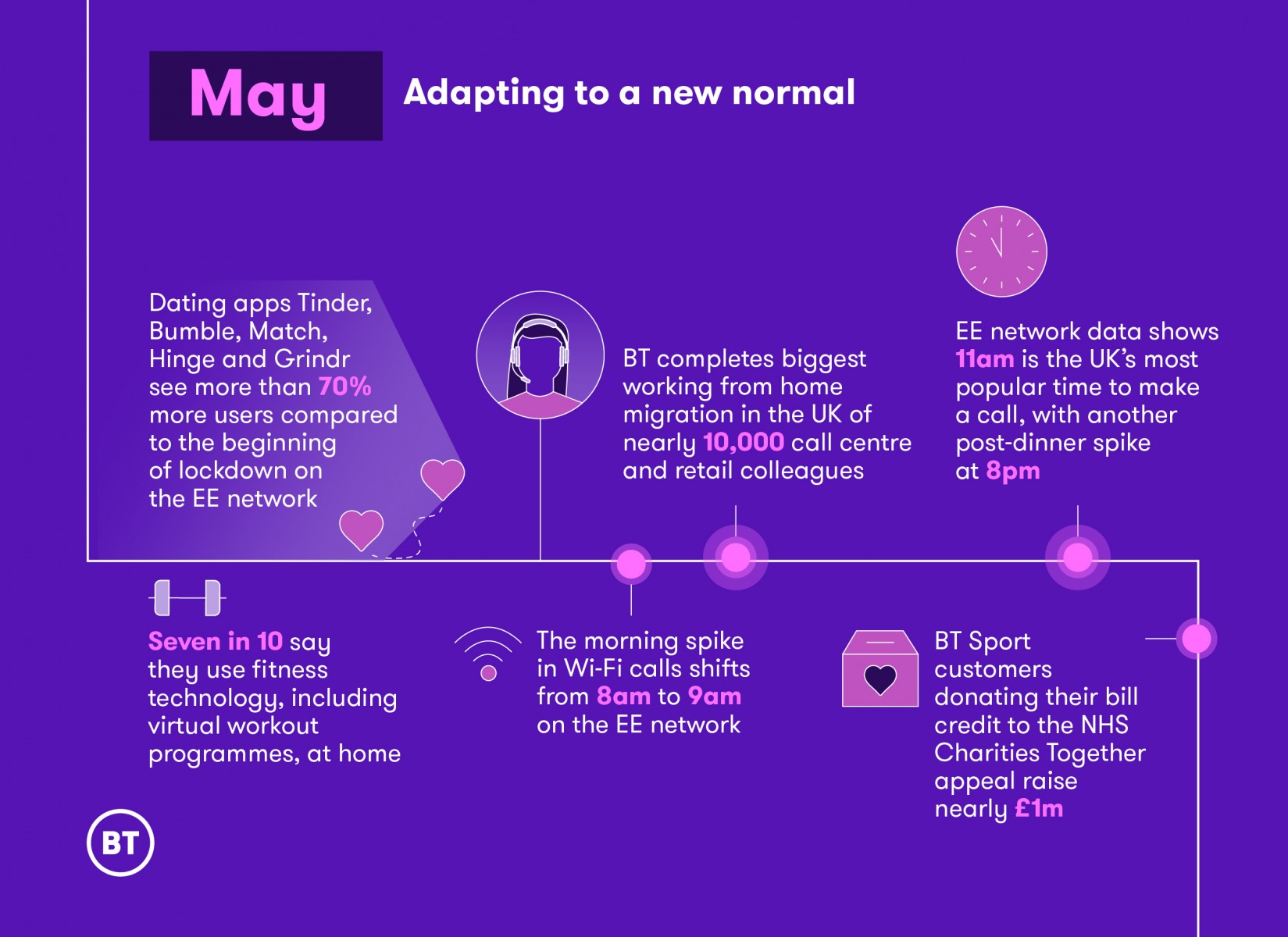As the UK reaches 100 days of lockdown, BT reveals how the nation has embraced technology to overcome the changes to daily life. Over half of Brits are now using technology more than ever to work from home, beat boredom, stay fit and keep connected with friends and family. As lockdown begins to lift and the nation looks to the future, research and data from BT tells the story of Britain in lockdown and finds the majority of the UK believe that some new habits are here to stay.
Marc Allera, CEO of BT’s Consumer division: “The past 100 days have completely changed how we live and interact with each other. We’ve all had to adapt how we go about our daily lives, from the ways we learn, work, shop, keep active to how we connect with each other. Technology has been key to navigating this new world and as a nation we’ve been embracing its potential with over a third of us developing new skills.
It’s clear that the service we provide has never been more important to our customers. From keeping connected to staying educated and entertained, I’m proud that we’ve served the nation. Across our brands we have introduced over 20 new initiatives to help the country adapt during these tough times and continue to help as we return to a new normality.”
March - Keeping connected as lockdown begins
When the UK entered lockdown on 23rd March, the nation embraced new, and old ways to keep connected. Zoom users on EE’s network increased fivefold during lockdown compared to earlier in the year. But most of the nation reached for the phone to keep in touch with loved ones, with over half of Brits dialing to stay connected. BT’s data shows that they had a lot to talk about, with a huge 90% increase in calls lasting over 5 minutes compared to February. Those not dialing were typing, with text messaging the second preferred communication method followed by video–calling.
Lockdown meant we couldn’t see our family and friends, but for those directly affected by coronavirus being connected was more important than ever - BT supported the new Nightingale field hospitals to get connected quickly. The ExCeL Nightingale hospital was installed with 1,000 digital phones and handsets as well as high-speed Wi-Fi connectivity in just 48 hours. Over 260,000 NHS staff received the EE & BT unlimited mobile data offer launched in April, and EE donated 8,000 rechargeable power banks to the NHS.
April - Upskilling the UK through tech
With more time spent at home, the country found new ways to put their time to good use. Four in five Brits claimed they managed to stay productive and one in six found new ways to learn online. To help upskill the nation, BT launched Top Tips on Tech with ITV – a two week long daily series of how-to-guides during prime-time TV demonstrating digital skills like WhatsApp calls and booking online GP appointments. It wasn’t just individuals who suddenly needed to adapt their skills during lockdown, BT reached over 40,000 business owners and employees with digital skills training too.
With children at home and many parents becoming teachers overnight, BT’s Barefoot platform supported parents and teachers with home-schooling. The programme reached nearly 70,000 primary school teachers and two million pupils across UK primary schools, with the ‘Learn at Home’ page seeing a 1,100% spike in traffic during lockdown.
May – Discovering a Work / Life balance
All bets were off in May as the suspension of live sports and events meant many found new ways to feel a sense of community through live fitness sessions, online gaming, and online concerts. In a show of support to the nation crisis, BT Sport customers donated a total of £1m to the NHS through paused subscription payments.
For singletons and couples living apart, dating also went virtual. 16 - 24-year olds were the most willing to try their hand at virtual dating, with one in ten using video calls for dating in lockdown. EE’s network usage reveals dating apps including Tinder, Bumble, Match, Hinge and Grindr saw over 70% more users compared to the beginning of lockdown.
As working from home became the norm, BT undertook one of the UK’s biggest office to home working migration, with nearly 10,000 Consumer call centre staff from BT, EE and Plusnet becoming virtual contact centres. Commutes drastically reduced and became a matter of travelling downstairs, BT data showed workdays start later, with the spike in Wi-Fi calls shifting from 8am to 9am, whilst 11am remaining the peak call time.
With the home now also becoming an office and a school, the nation adapted to achieve a work-life balance. Half of those surveyed claim they’ve improved their habits in the past 100 days, and this includes being more active. One fifth of adults explored their local area by exercising outside during lockdown and seven in ten said they used fitness technology, including virtual workout programmes, at home during lockdown.
June - Looking to the future
Half of Brits claimed they changed their habits for the better during lockdown and looking to the future, BT research shows the nation is assessing the changes they will keep in place. Four out of 10 agree that they have discovered new digital skills they plan to keep using after lockdown including booking virtual appointments, mobile banking, and online GP services.
With the majority of schools not set to re-open until September, BT will provide in-need families with six months free access to the UK’s largest Wi-Fi network which extends to 5.5 million Wi-Fi hotspots around the country to help keep children learning.
Almost a third of Brits will continue to shop online for non-essentials, yet over a quarter admitted they can’t wait to get back to the high street. An overwhelming 89% of survey respondents said they’re in favour of shops having virtual booking systems rather than physical queues.



